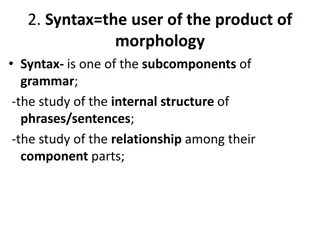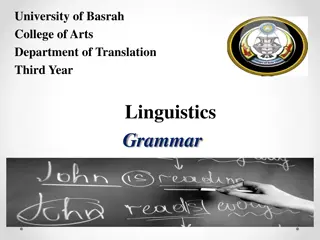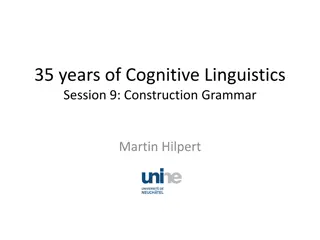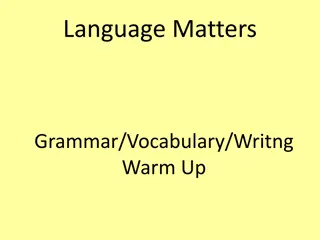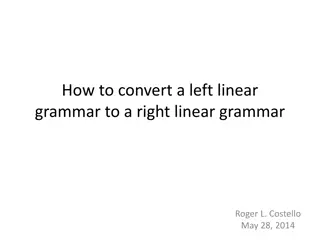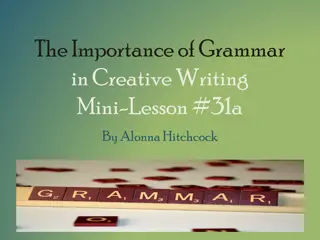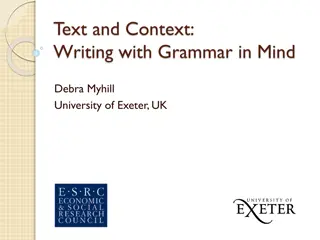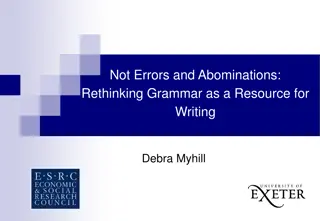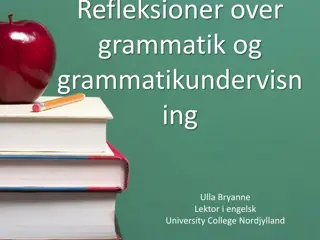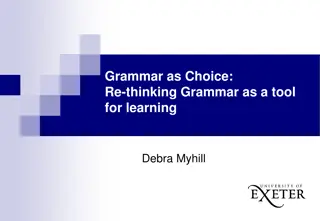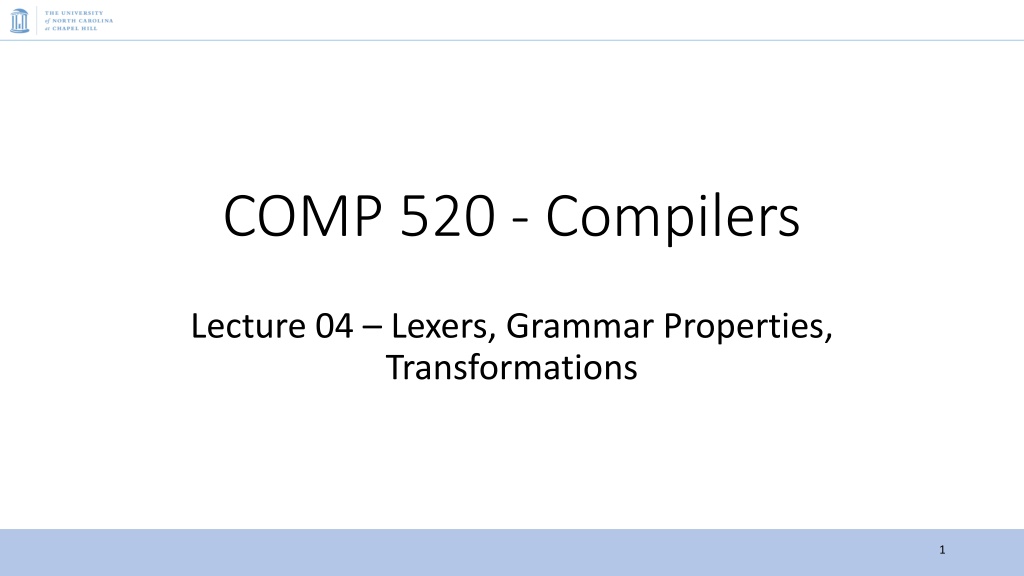
Lexical Analysis in Compiler Construction
Explore the concepts of lexical analysis in compiler construction, including the role of lexers, grammar properties, transformations, and the importance of LL(1) parsing. Discover how scanners extract tokens from a character stream and the scanning approach in parsing. Understand the significance of whitespace handling in scanners for token identification.
Download Presentation

Please find below an Image/Link to download the presentation.
The content on the website is provided AS IS for your information and personal use only. It may not be sold, licensed, or shared on other websites without obtaining consent from the author. Download presentation by click this link. If you encounter any issues during the download, it is possible that the publisher has removed the file from their server.
E N D
Presentation Transcript
COMP 520 - Compilers Lecture 04 Lexers, Grammar Properties, Transformations 1
Is miniJava LL(1)? Why or why not? What are some languages that are LL(1)? 2 COMP 520: Compilers S. Ali
Previous Lecture Leftmost derivation Top-down parsing with a PDA Recursive descent parsing 3 COMP 520: Compilers S. Ali
Previous Lecture (2) LL(1) condition Parser can always predict using the next (1) input token Reading Left to Right Using Leftmost derviation 4 COMP 520: Compilers S. Ali
Final Exam Date Posted On the syllabus Thursday May 9th, 2024 5 COMP 520: Compilers S. Ali
Lexical Analysis Theory 6 COMP 520: Compilers S. Ali
Scanners (Lexers) Purpose: extract Tokens from a character stream Recall: a Token is a terminal symbol in the parser grammar Examples: A number, identifier, operator, or keyword 7 COMP 520: Compilers Jan Prins
Scanning Approach Similar to parsing with some key exceptions: The scanner grammar is simple. Terminals are individual characters Non-terminals are the terminals (Tokens) of the Parser 8 COMP 520: Compilers Jan Prins
Scanning Approach Similar to parsing with some key exceptions: The scanner grammar is simple. Terminals are individual characters Non-terminals are the terminals (Tokens) of the Parser The rule for each non-terminal is a regular expression Thus no need for recursion in scanner grammar 9 COMP 520: Compilers Jan Prins
Whitespace in the Scanner Consider the two character == Should each = =be a Token and then the Parser check for == looking for and accepting two = Tokens? == operator == by 10 COMP 520: Compilers S. Ali
Handling multi-character Tokens Note, = is not an operator, but instead used only for assignment as a standalone statement or local variable initialization (not as a part of an expression) in miniJava Thus as an example, = is a TokenType.Equals while == is TokenType.Operator So the scanner has a choice to make: 11 COMP 520: Compilers S. Ali
Handling multi-character Tokens So the scanner has a choice to make: = = TokenType.Equals TokenType.Operator 12 COMP 520: Compilers S. Ali
End of Tokens Lastly, the Scanner must have an elegant way of conveying the source file has no more Tokens to produce. Can be done by returning a null Token, or a TokenType.EOT, or however you want to code the scan method. 13 COMP 520: Compilers Jan Prins, S. Ali
Scanner Grammar By looking at leaf nodes in the Grammar graph, we can find our Tokens. Token ::= Operator | Number | Identifier | Keyword Number ::= Digit | Number Digit Identifier ::= Alpha | Identifier AlphaNumUnderscore Keyword ::= while | class | public| Note: there is a problem! 14 COMP 520: Compilers S. Ali
Hold on! Those grammar rules do not look like regular expressions: Number ::= Digit | Number Digit Identifier ::= Alpha | Identifier AlphaNumUnderscore They use recursion! Can we translate this grammar? 15 COMP 520: Compilers S. Ali
EBNF Grammars Extended Backus-Naur Form 16 COMP 520: Compilers S. Ali
Backus-Naur Form CFG has a rule in the form ? = ? where ? ? Sequence ? can contain: Sequences of terminals and non-terminals (? ?) IfStmt ::= if Exp then Stmt ElsePart SkipStmt ::= skip Empty Sequence 17 COMP 520: Compilers Jan Prins, S. Ali
Extended Backus-Naur Form Sequence ? can contain: Sequences allowed in BNF Choice | ElsePart ::= else Stmt | Repetition * BlockStmt ::= { Statement* } Grouping () ClassDeclaration ::= classid { (FieldDeclaration|MethodDeclaration)* } 18 COMP 520: Compilers Jan Prins, S. Ali
More EBNF Rules If interested in EBNF grammars: https://en.wikipedia.org/wiki/Extended_Backus%E2%80%93Naur_form 19 COMP 520: Compilers S. Ali
New Sentence Generation Rule A sentence w is generated by EBNF Grammar G if: Recall: ?1 ?2 ??, where ??= w and S = ?1 S is the start symbol w consists exclusively of terminals ?? ??+1 if ??= ??? and ??+1= ??? W ::= ? is a rule in G NEW RULE: ??? EBNF grammars G generate L(G), and L(G) is a CFG 20 COMP 520: Compilers Jan Prins, S. Ali
New Sentence Generation Rule A sentence w is generated by EBNF Grammar G if: Recall: ?1 ?2 ??, where ??= w and S = ?1 S is the start symbol w consists exclusively of terminals ?? ??+1 if ??= ??? and ??+1= ??? W ::= ? is a rule in G Regular expression ? can generate ? EBNF grammars G generate L(G), and L(G) is a CFG 21 COMP 520: Compilers Jan Prins, S. Ali
EBNF EBNF is a convenience Any EBNF can be rewritten as a CFG Example: Eliminate EBNF extensions in this rule: ArgumentList ::= Expression (,Expression)* 22 COMP 520: Compilers S. Ali
EBNF EBNF is a convenience Any EBNF can be rewritten as a CFG Example: Eliminate EBNF extensions in this rule: ArgumentList ::= Expression (,Expression)* -=-=-=-=-=-=-=-=-=-=-=- ArgumentList ::= Expression ArgumentList ::= Expression, ArgumentList 23 COMP 520: Compilers S. Ali
EBNF Benefits Why? Simpler expression of grammars Better target for grammar transformations Most importantly: Much easier to write recursive descent parsers once you have transformed a grammar into EBNF 24 COMP 520: Compilers Jan Prins, S. Ali
Grammar Transformations 25 COMP 520: Compilers S. Ali
Substitution method CFG EBNF C ::= A b D A ::= c | d ? 26 COMP 520: Compilers S. Ali
Substitution method CFG EBNF C ::= A b D A ::= c | d C ::= (c | d) b D 27 COMP 520: Compilers Jan Prins, S. Ali
Left-Factorization Original Easier to parse and convenient IfStmt ::= if Exp then Stmt | if Exp then Stmt else Stmt IfStmt ::= if Exp then Stmt ( | else Stmt) 28 COMP 520: Compilers Jan Prins, S. Ali
Remove Left Recursion Original Easier to parse and convenient N ::= X | NY N ::= X (Y)* Question: Can you do the same below? If so, how? Reference ::= id | this | Reference . id 29 COMP 520: Compilers Jan Prins, S. Ali
Simplification Example This grammar is not very easy to read: E ::= T | E Op T T ::= (E) | num Op ::= + | 30 COMP 520: Compilers Jan Prins, S. Ali
Simplification Example This grammar is not very easy to read: E ::= T | E Op T T ::= (E) | num Op ::= + | Remove left recursion E ::= T (Op T)* T ::= (E) | num Op ::= + | 31 COMP 520: Compilers Jan Prins, S. Ali
Simplification Example This grammar is not very easy to read: E ::= T | E Op T T ::= (E) | num Op ::= + | Remove left recursion E ::= T (Op T)* T ::= (E) | num Op ::= + | Substitute Op for E E ::= T ((+| ) T)* 32 COMP 520: Compilers Jan Prins, S. Ali
Simplification Example This grammar is not very easy to read: E ::= T | E Op T T ::= (E) | num Op ::= + | Remove left recursion E ::= T (Op T)* T ::= (E) | num Op ::= + | Substitute Op for E E ::= T ((+| ) T)* Much Easier Result: E ::= T ((+| ) T)* T ::= (E) | num 33 COMP 520: Compilers Jan Prins, S. Ali
Exercise- Simplify these, and are they LL(1)? Right recursion Left and Right recursion E ::= T | T Op E T ::= (E) | num Op ::= + | E ::= T | E Op E T ::= (E) | num Op ::= + | 34 COMP 520: Compilers S. Ali
EBNF and Recursive Descent How exactly is EBNF helpful for RD? Let s explore! 35 COMP 520: Compilers S. Ali
The Basics for EBNF and RD Choice Repetition Conditional: ? | ? Implemented with an if statement If LL(1), only need to check current Token Repetition: ?* Implemented with a while statement Condition depends on the starter set for ? 36 COMP 520: Compilers Jan Prins, S. Ali
The Basics for EBNF and RD Choice Repetition Conditional: ? | ? Implemented with an if statement If LL(1), only need to check current Token Repetition: ?* Implemented with a while statement Condition depends on the starter set for ? 37 COMP 520: Compilers Jan Prins, S. Ali
Consider the Example from Earlier S ::= E $ E ::= T ((+| ) T)* T ::= ( E ) | num num = {0, 1, , 9} 38 COMP 520: Compilers Jan Prins, S. Ali
Consider the Example from Earlier: Solution S ::= E $ E ::= T ((+| ) T)* T ::= ( E ) | num num = {0, 1, , 9} 39 COMP 520: Compilers Jan Prins, S. Ali
Consider the Example from Earlier: Solution S ::= E $ E ::= T ((+| ) T)* T ::= ( E ) | num num = {0, 1, , 9} It s like it writes itself! 40 COMP 520: Compilers Jan Prins, S. Ali
Helpful Definitions and Properties for EBNF Grammars 41 COMP 520: Compilers S. Ali
One Rule to Ring them all Together Given an EBNF grammar.. Multiple rules with the same non-terminal can be combined E.g. A ::= ?1 A ::= ?2 A ::= ?3 A ::= ?1 ?2 ?3 42 COMP 520: Compilers Jan Prins, S. Ali
Nullable Nullable[?] Can ? derive the empty string? Examples: Visibility ::= (public|private)? BlockStmt ::= { Statement* } 43 COMP 520: Compilers S. Ali
Starters Starters[?] is a set of terminals that indicate the current sequence could be ? Includes if Nullable[?] What is Starters[Reference]? Reference ::= id | this | Reference .id 44 COMP 520: Compilers Jan Prins, S. Ali
Followers Followers(A) where A N .. is a set of terminals that may follow A That means after parsing A, what terminals occur afterwards? Note, there exists a form of augmented grammars where ONLY Followers(S) can include 45 COMP 520: Compilers Jan Prins, S. Ali
More EBNF Thursday, Back to Lexical Analysis 46 COMP 520: Compilers S. Ali
Remove Recursion These was previously an issue: Number ::= Digit | Number Digit Identifier ::= Alpha | Identifier AlphaNumUnderscore With our grammar techniques, can we remove recursion? 47 COMP 520: Compilers S. Ali
Remove Recursion These was previously an issue Number ::= Digit | Number Digit Identifier ::= Alpha | Identifier AlphaNumUnderscore With our grammar techniques, can we remove recursion? YES! Number ::= Digit (Digit)* Identifier ::= Alpha (AlphaNumUnderscore)* 48 COMP 520: Compilers S. Ali
Lexical Parsing Longest Match Generally speaking, choosing the longest Token often works best Not always true, there are some crazy examples E.g., pick >= over > So even if your language is LL(1), your Scanner might be hiding some lexical parsing complexities! 49 COMP 520: Compilers Jan Prins, S. Ali
Lexical Parsing LL(1) does not apply The Scanner may be hiding some look more than 1 character ahead, but that appears unavoidable for most languages. Consider IntLiteral / FloatLiteral (note FloatLiteral is not in miniJava) if( currentChar in [ 0 9 ] ) { Accumulate letters until non-digit if( currentChar != . ) return makeToken(IntLiteral); Accumulate letters until non-digit return makeToken(FloatLiteral); } 50 COMP 520: Compilers S. Ali



